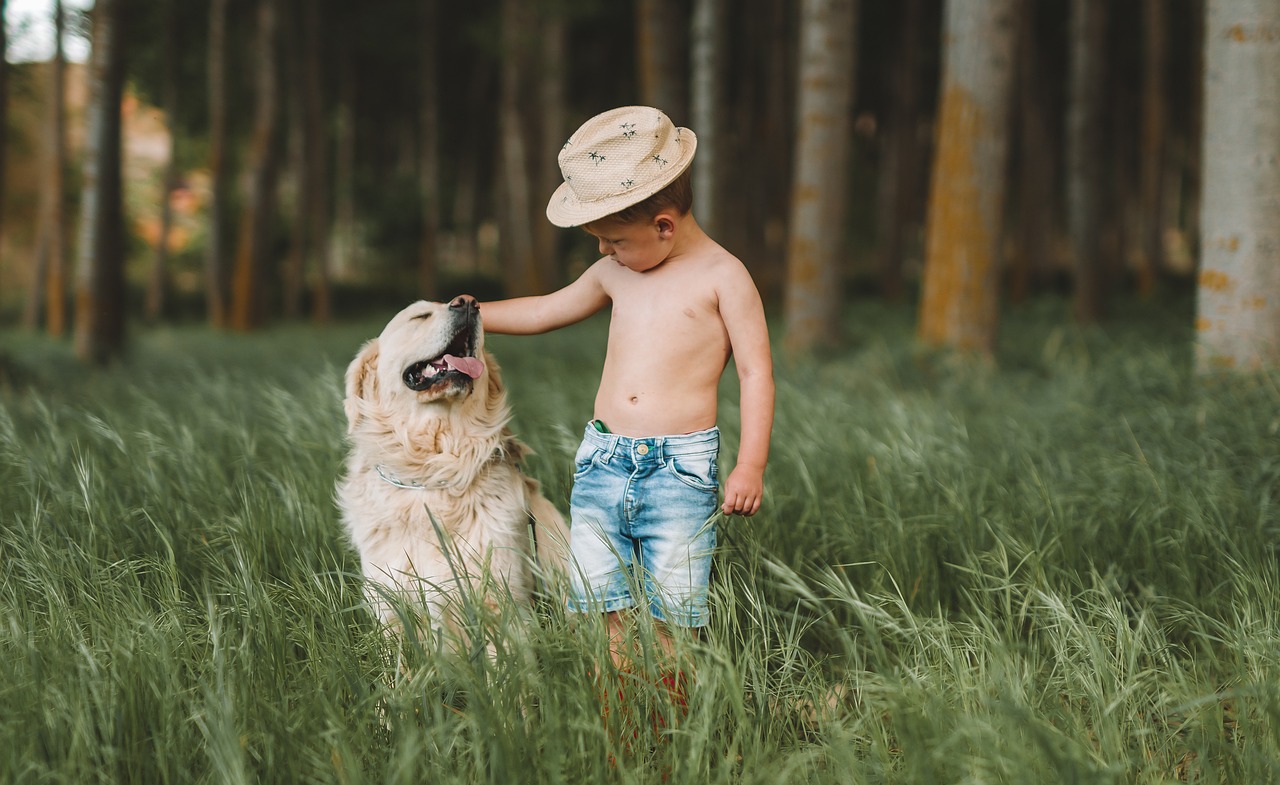The Gentle Nature of the Chinese Shar-Pei
The Chinese Shar-Pei is a breed that often surprises people with its gentle demeanor and unique appearance. With its characteristic wrinkled skin and distinctive "hippopotamus" face, this breed is not just a pretty face; it possesses a temperament that makes it a wonderful companion. Known for their loyalty and calm nature, Shar-Peis are often described as gentle giants, despite their somewhat intimidating looks. They are a breed that thrives in family settings, offering both protection and affection. But what truly sets them apart is their ability to bond deeply with their human companions, making them not just pets, but part of the family.
In a world where many dogs are hyperactive and demanding, the Shar-Pei stands out with its composed and serene personality. They are not the type to jump on guests or bark incessantly. Instead, they observe their surroundings with a calm curiosity, making them excellent watchdogs. Their protective instincts ensure that they will stand guard over their loved ones, but their gentle nature means they are not aggressive. This balance of traits makes them suitable for families with children and other pets, as they can be both protective and nurturing.
However, owning a Shar-Pei comes with its own set of responsibilities. Their unique temperament requires understanding and patience from their owners. It's essential to recognize that while they are generally calm, they also need proper training and socialization to thrive. With the right approach, you can unlock the full potential of your Shar-Pei's personality, ensuring that they remain a loving and gentle member of your household.
As we delve deeper into the characteristics and care needs of the Shar-Pei, we will explore how their temperament influences their interactions with family and other pets, their training requirements, and the health considerations that are crucial for their well-being. Understanding these aspects will not only enhance your relationship with your Shar-Pei but also contribute to a harmonious living environment.
- Are Shar-Peis good with children? Yes, Shar-Peis are known for their gentle nature and can be very protective of children.
- How much exercise do Shar-Peis need? Shar-Peis require moderate exercise, such as daily walks and playtime, to maintain their health.
- What are common health issues in Shar-Peis? They can be prone to skin issues and hip dysplasia, so regular vet check-ups are important.
- Do Shar-Peis require special grooming? Yes, their wrinkles need regular cleaning to prevent skin infections.

Understanding the Shar-Pei Temperament
The Chinese Shar-Pei is often recognized for its unique look, but what truly sets this breed apart is its gentle and calm demeanor. These dogs are not just about their iconic wrinkled skin; they have a personality that can light up any home. Understanding the Shar-Pei temperament is crucial for potential owners, as it helps in creating a harmonious living environment that suits both the dog and the family. They are known to be loyal companions, often forming strong bonds with their owners. This loyalty, combined with their protective nature, makes them excellent family pets.
One of the most appealing aspects of the Shar-Pei is their composed nature. Unlike some high-energy breeds that require constant stimulation, Shar-Peis are relatively low-key. They enjoy lounging around the house just as much as they love going for a walk. This makes them adaptable to various living situations, whether you live in a bustling city or a quiet suburb. However, it's essential to remember that while they are calm, they still need adequate exercise and mental stimulation to keep them happy and healthy.
Another important factor to consider is their independence. Shar-Peis are known for being somewhat aloof, especially with strangers. This characteristic can sometimes be mistaken for standoffishness, but it’s just a part of their personality. They are naturally protective of their families, making them great watchdogs. However, this independence also means that they can be a bit stubborn during training. Understanding this aspect of their temperament will help owners approach training with patience and consistency.
Socialization plays a vital role in developing a well-rounded Shar-Pei. Early exposure to various environments, people, and other animals is essential. Without proper socialization, a Shar-Pei may become overly wary of strangers or other pets. This could lead to behavioral issues that are difficult to manage. Therefore, it is crucial to introduce them to new experiences gradually, allowing them to build confidence and adaptability.
In summary, the Shar-Pei's temperament is a blend of gentleness, loyalty, and independence. They make wonderful family pets, provided that their needs for socialization, exercise, and training are met. By understanding their unique nature, potential owners can ensure a fulfilling relationship with their Shar-Pei, characterized by mutual respect and love.

Socialization Needs
When it comes to the Chinese Shar-Pei, socialization isn't just a fancy term thrown around by dog trainers; it's a vital component in shaping a well-adjusted and happy pet. These dogs, known for their distinctive wrinkled faces and calm demeanor, thrive in environments where they feel secure and confident. Just like a child who learns best in a nurturing environment, a Shar-Pei that is properly socialized will grow up to be a well-rounded companion. Think about it: would you want to be thrown into a crowded room full of strangers without any prior introductions? Of course not! Dogs feel similarly, and early socialization helps them navigate the world around them.
Starting from a young age, exposing your Shar-Pei to various environments, people, and other animals is crucial. This exposure not only builds their confidence but also reduces the likelihood of anxiety and fearfulness in new situations. For instance, consider taking your pup to the local park, where they can interact with different breeds and enjoy the sights and sounds of the outdoors. Additionally, enrolling them in puppy classes can be a fantastic way to meet other dogs and learn basic commands in a controlled setting.
Socialization can be broken down into several key areas that owners should focus on:
- People Interaction: Introduce your Shar-Pei to a variety of people, including children, adults, and seniors. This helps them become comfortable around different ages and personalities.
- Animal Exposure: Allow your dog to meet other pets, whether they are dogs, cats, or even smaller animals. This teaches them how to behave around other creatures and reduces territorial instincts.
- Environmental Experiences: Take your Shar-Pei on car rides, to different parks, or even to pet-friendly stores. Each new environment will contribute to their adaptability.
As you embark on this socialization journey, remember that patience is key. Each dog has its own unique personality, and some may take longer to adjust than others. It's essential to observe your Shar-Pei's reactions and proceed at their pace. If they seem overwhelmed, it's perfectly okay to take a step back and try again later. Think of it like building a bridge: you want to lay each plank carefully to ensure it’s sturdy enough to walk across. The same goes for your Shar-Pei's social skills.
In conclusion, socialization is not merely a checklist item; it's a fundamental aspect of your Shar-Pei's upbringing. By investing time and effort into their social development, you're not just creating a well-behaved dog; you're nurturing a loyal companion who will thrive in any situation. So, get out there and start socializing—your furry friend will thank you for it!
Importance of Early Training
Training your Chinese Shar-Pei early in their life is not just a suggestion; it's a necessity. Imagine trying to build a house without a solid foundation—it's bound to crumble! Similarly, starting training when your Shar-Pei is a puppy lays the groundwork for a well-behaved adult dog. Early training helps establish boundaries, which is crucial for a breed known for its stubborn streak. When you set clear rules from the get-go, you create a sense of structure that your furry friend will thrive in.
Moreover, early training fosters a strong bond between you and your Shar-Pei. Think of it as a dance; the more you practice together, the more in sync you become. Engaging in training sessions not only teaches your dog essential commands but also builds trust and communication between the two of you. This connection is vital for a breed that is naturally loyal and protective. A well-trained Shar-Pei is not just a companion; they become an integral part of your family, understanding their place and role within the household.
In addition to establishing boundaries and strengthening your bond, early training also prepares your Shar-Pei for various situations they may encounter throughout their lives. Whether it's meeting new people, interacting with other pets, or navigating different environments, a well-trained dog is more adaptable and confident. This adaptability is particularly important for Shar-Peis, who may be reserved or cautious around strangers. The more experiences they have during their formative months, the better equipped they will be to handle life's surprises.
To illustrate the importance of early training, consider this: a well-trained Shar-Pei is less likely to develop behavioral issues that can arise from anxiety or fear. By teaching them how to behave in different scenarios, you're reducing the chances of problems like aggression or excessive barking. This proactive approach not only benefits your dog but also contributes to a peaceful home environment, where everyone—two-legged and four-legged—can coexist harmoniously.
In summary, early training is a crucial investment in your Shar-Pei's future. It sets the stage for a well-adjusted, confident, and loving companion. So grab those treats, find a cozy spot, and get ready to embark on this rewarding journey with your adorable, wrinkly friend!
- What age should I start training my Shar-Pei?
It's best to start training as early as 8 weeks old, as this is when they are most receptive to learning. - How long should training sessions be?
Keep training sessions short and engaging, around 5 to 10 minutes, to hold their attention. - What commands should I focus on first?
Start with basic commands like "sit," "stay," and "come" to establish a foundation for further training. - Can I train my Shar-Pei on my own?
Yes, but consider enrolling in a puppy training class for additional guidance and socialization opportunities.
Positive Reinforcement Techniques
When it comes to training your Chinese Shar-Pei, are your best friends. Imagine trying to teach a child how to ride a bike; would you yell at them for falling, or would you encourage them with praise when they succeed? The same principle applies to your furry friend. By rewarding good behavior rather than punishing mistakes, you create a nurturing environment where your Shar-Pei feels safe and motivated to learn.
One effective method of positive reinforcement is the use of treats. Dogs, much like us humans, love a tasty reward! When your Shar-Pei follows a command, be it "sit," "stay," or "come," immediately offer them a treat. This not only encourages the behavior but also strengthens the bond between you and your pet. Over time, your Shar-Pei will associate the command with the positive outcome of receiving a treat, making them more likely to obey in the future.
Additionally, verbal praise is a powerful tool. Dogs are incredibly attuned to our voices. When your Shar-Pei performs well, use a cheerful tone to say, "Good boy!" or "Well done!" This verbal affirmation can be just as rewarding as a treat. It’s important that your praise is enthusiastic; your excitement will resonate with your dog, reinforcing their positive behavior.
Another fantastic technique is incorporating playtime as a reward. For example, if your Shar-Pei successfully completes a training session, celebrate by playing their favorite game or engaging in a fun activity. This not only makes training enjoyable but also helps your dog to associate learning with fun, making them more eager to participate.
However, it’s essential to be consistent with your reinforcement techniques. If you reward your Shar-Pei for sitting one day but ignore the behavior the next, they may become confused about what is expected of them. Consistency is key to effective training. Consider keeping a training journal to track your dog's progress and ensure that you are consistently rewarding the desired behaviors.
Lastly, patience is crucial. Remember, training is a journey, not a race. Every dog learns at their own pace, and Shar-Peis can sometimes be a bit stubborn. If your dog doesn’t respond immediately, don’t get discouraged. Instead, take a step back, reassess your approach, and keep trying. With time, love, and the right techniques, your Shar-Pei will flourish into a well-behaved companion.
- What is positive reinforcement? Positive reinforcement involves rewarding desired behaviors to encourage them to occur again in the future.
- Can I use negative reinforcement? While some owners may resort to negative reinforcement, it can harm the bond between you and your dog. Positive reinforcement is generally more effective and humane.
- How do I know what treats to use? Use small, soft treats that your Shar-Pei loves. Experiment to find what they respond to best!
- How long should training sessions last? Short, frequent training sessions of about 5-10 minutes are usually most effective for maintaining your dog's attention.
Common Training Challenges
Training a Chinese Shar-Pei can be an enlightening journey, but it’s not without its hurdles. One of the most significant challenges owners face is the breed's inherent stubbornness. This trait often leads to a battle of wills between the dog and the owner, where the Shar-Pei may simply refuse to comply with commands. Imagine trying to convince a toddler to eat their vegetables; it’s a test of patience and creativity!
Another challenge is their independent nature. Shar-Peis are known for their self-sufficient attitude, which can sometimes translate into a lack of enthusiasm for training sessions. They might seem more interested in exploring their surroundings or lounging in a sunny spot than in following your lead. Therefore, keeping training sessions engaging and fun is crucial. Incorporate games and activities that capture their attention, much like you would for a child who prefers play over study.
Additionally, Shar-Peis can be sensitive to harsh training methods. This breed thrives on positive reinforcement, and using negative techniques can lead to fear or anxiety, making the training process even more challenging. It’s essential to approach training with a gentle hand, rewarding good behavior with treats, praise, or playtime. Consider this: would you want to learn something new from someone who constantly scolded you? Probably not! So, why would your Shar-Pei?
To help owners navigate these challenges, here are some common training obstacles along with tips to overcome them:
- Stubbornness: Use patience and consistency. Short, frequent training sessions can help maintain their interest.
- Distraction: Choose a quiet training environment free from distractions to help your Shar-Pei focus.
- Independence: Incorporate fun activities and games into training to keep them engaged.
- Sensitivity to correction: Always opt for positive reinforcement to build trust and confidence.
Ultimately, understanding these common training challenges can significantly improve the training experience for both the owner and the Shar-Pei. By adopting a patient and positive approach, owners can foster a strong bond with their furry friend, paving the way for a well-behaved and happy companion.
Q: Are Shar-Peis good for first-time dog owners?
A: While they can be a bit challenging due to their stubbornness, with patience and the right training techniques, they can be a rewarding choice for first-time owners.
Q: How long does it take to train a Shar-Pei?
A: Training duration varies, but consistency and daily practice can lead to noticeable improvements within a few weeks.
Q: What is the best way to socialize a Shar-Pei?
A: Early exposure to various environments, people, and other animals is crucial. Puppy classes can be an excellent way to facilitate this.
Q: Can Shar-Peis be left alone for long periods?
A: Shar-Peis can tolerate some alone time, but they thrive on companionship and may develop separation anxiety if left alone too often.
Family Compatibility
The gentle nature of the Chinese Shar-Pei makes them an excellent choice for families. These dogs are not just loyal companions; they are also incredibly protective, which adds an extra layer of security to any household. Imagine having a furry friend who is both a playful buddy for your kids and a vigilant guardian when the situation calls for it. This unique blend of traits makes the Shar-Pei a remarkable addition to family life.
One of the most appealing aspects of Shar-Peis is their calm demeanor. They are generally low-energy dogs, which means they can adapt well to various living situations, whether you live in a bustling household or a quieter environment. Their ability to remain composed even in the midst of chaos is a quality that many families find comforting. However, this doesn’t mean they don’t enjoy playtime! Shar-Peis love to engage with their families, and a game of fetch or a leisurely walk can bring out their playful side.
Moreover, Shar-Peis are known for their strong bonding abilities. They tend to form deep connections with their families, often following their owners from room to room. This loyalty is especially evident when it comes to children. The Shar-Pei’s protective instincts shine through, making them attentive and caring companions for little ones. Many families report that their Shar-Pei is not just a pet but a member of the family, always ready to lend a listening ear or a comforting paw.
However, it’s important to remember that every dog has its personality. While the Shar-Pei is generally friendly, early socialization is key to ensuring they grow up to be well-adjusted adults. Exposing them to various environments, people, and other pets helps them develop confidence and reduces the likelihood of any behavioral issues. A well-socialized Shar-Pei is often more adaptable and can handle new situations with ease, making family outings and gatherings a breeze.
In conclusion, the Chinese Shar-Pei’s gentle nature, loyalty, and protective instincts make them a fantastic choice for families. They are not just dogs; they are loving companions that enrich family life. With the right care, training, and socialization, a Shar-Pei can become an integral part of any family, providing love and security for years to come.
- Are Shar-Peis good with children? Yes, Shar-Peis are generally good with children and often form strong bonds with them.
- Do Shar-Peis require a lot of exercise? While they enjoy playtime, they are relatively low-energy dogs and do not require excessive exercise.
- How do I train a Shar-Pei? Positive reinforcement techniques work best, and early training is crucial for establishing good behavior.
- What health issues should I be aware of? Shar-Peis can be prone to skin problems and hip dysplasia, so regular vet check-ups are important.

Health Considerations
When it comes to the Chinese Shar-Pei, understanding their health considerations is not just important—it's essential for responsible pet ownership. These dogs, with their unique wrinkled skin and distinctive appearance, require special attention to ensure they lead a long, happy, and healthy life. Regular veterinary check-ups are crucial; they help catch any potential health issues early, which can make a world of difference in treatment outcomes. Just like us, our furry friends thrive when they receive preventative care, so don’t skip those vet visits!
Shar-Peis are known to be prone to a few breed-specific health issues. For instance, skin problems are quite common due to their unique folds, which can trap moisture and lead to infections. Additionally, hip dysplasia is another concern that potential owners should be aware of. This condition can cause significant discomfort and mobility issues if not addressed promptly. Being informed about these conditions allows owners to take proactive measures to ensure their pet's health and happiness.
| Common Health Issues | Description | Prevention/Treatment |
|---|---|---|
| Skin Problems | Infections or irritations caused by moisture trapped in skin folds. | Regular cleaning of skin folds and prompt veterinary care. |
| Hip Dysplasia | A genetic condition causing malformation of the hip joint. | Weight management and physical therapy; surgery in severe cases. |
| Entropion | A condition where the eyelids roll inward, causing irritation. | Regular eye check-ups and surgical correction if necessary. |
Maintaining a healthy lifestyle is key for your Shar-Pei. This breed thrives on a balanced diet and regular exercise. Owners should prioritize nutrition by providing high-quality dog food that meets their specific dietary needs. It’s important to consult with your veterinarian to determine the best diet plan for your furry companion. Think of their diet as a foundation—just like a house, if the foundation is weak, everything else may crumble.
Exercise is equally crucial. While Shar-Peis are not the most hyperactive breed, they still require daily walks and playtime to keep them fit and mentally stimulated. A well-exercised Shar-Pei is a happy Shar-Pei! Not only does this help prevent obesity-related issues, but it also strengthens the bond between you and your pet. So, grab that leash and enjoy the outdoors together!
- What are the most common health issues in Shar-Peis? Skin problems, hip dysplasia, and entropion are among the most prevalent health concerns.
- How often should I take my Shar-Pei to the vet? Regular check-ups at least once a year are recommended, but more frequent visits may be necessary if health issues arise.
- What type of diet is best for a Shar-Pei? A high-quality, balanced diet formulated for their age, weight, and activity level is ideal.
- How much exercise does a Shar-Pei need? Daily walks and playtime for at least 30 minutes are important to keep them healthy and happy.
Common Health Issues
The Chinese Shar-Pei, while known for their unique appearance and gentle temperament, can be susceptible to a variety of health issues. As a responsible owner, it's essential to be aware of these potential problems to ensure your furry friend leads a happy and healthy life. One of the most common concerns is skin problems, particularly due to their distinctive wrinkles. These folds can trap moisture and debris, leading to infections if not regularly cleaned. It's crucial to keep these areas dry and clean to prevent any discomfort.
Another significant health issue that Shar-Peis may face is hip dysplasia. This genetic condition affects the hip joint's development, leading to arthritis and pain as the dog ages. Regular vet check-ups can help in early detection, allowing for timely intervention. Moreover, maintaining a healthy weight is vital, as excess weight can exacerbate joint issues. A balanced diet and appropriate exercise play a key role in managing this risk.
Additionally, Shar-Peis are prone to certain eye conditions, such as entropion, where the eyelids roll inward, causing irritation to the cornea. This condition often requires surgical correction to prevent long-term damage. Regular eye examinations are essential to catch these issues early on.
| Health Issue | Description | Prevention/Treatment |
|---|---|---|
| Skin Problems | Infections due to moisture trapped in skin folds. | Regular cleaning and drying of wrinkles. |
| Hip Dysplasia | Genetic condition leading to arthritis and joint pain. | Regular vet check-ups, weight management, and exercise. |
| Entropion | Condition where eyelids roll inward, irritating the eye. | Surgical correction and regular eye exams. |
It's also worth noting that Shar-Peis can experience respiratory issues due to their unique facial structure. Brachycephalic breeds often have compromised airways, making them more susceptible to heat exhaustion and breathing difficulties. Therefore, it's essential to monitor their activity levels, especially in hot weather, and provide them with a cool, comfortable environment.
In summary, while the Shar-Pei is a resilient breed, being informed about these common health issues can make a significant difference in their quality of life. Regular veterinary visits, a balanced diet, and attentive care can help mitigate these risks, allowing your Shar-Pei to thrive as a beloved member of your family.
- What are the most common health issues in Shar-Peis? Skin problems, hip dysplasia, and entropion are prevalent in this breed.
- How can I prevent skin infections in my Shar-Pei? Regularly clean and dry the skin folds to prevent moisture buildup.
- Is hip dysplasia hereditary in Shar-Peis? Yes, hip dysplasia is a genetic condition, so responsible breeding practices are crucial.
- What should I do if I notice my Shar-Pei has eye problems? Consult your veterinarian for an eye examination and potential treatment options.
Maintaining a Healthy Lifestyle
Ensuring a healthy lifestyle for your Chinese Shar-Pei is crucial for their overall well-being and happiness. Just like us, dogs thrive on a balanced diet and regular exercise. But what does that really mean for our furry friends? First and foremost, let’s talk about nutrition. The Shar-Pei’s unique body structure and skin folds mean they require a diet that supports their specific health needs. High-quality dog food, rich in protein and essential nutrients, is a must. It’s important to look for formulas that are specifically designed for medium-sized breeds, as they help maintain a healthy weight and provide necessary energy levels.
When it comes to feeding, portion control is key. Overfeeding can lead to obesity, which is a common issue in Shar-Peis. To help you manage their diet effectively, here’s a simple feeding guideline:
| Age | Daily Food Amount |
|---|---|
| Puppy (8 weeks - 6 months) | 3-4 meals of 1/2 cup each |
| Adult (6 months - 7 years) | 2 meals of 1-1.5 cups each |
| Senior (7 years and older) | 2 meals of 1 cup each |
Now, let’s move on to exercise. Shar-Peis are not the most energetic breed, but they still require regular physical activity to stay fit and healthy. Daily walks, playtime, and mental stimulation are essential components of their exercise routine. It’s not just about burning off energy; it’s also about keeping their minds sharp. Engaging in activities such as fetch or puzzle toys can provide both physical exercise and mental challenges.
Moreover, remember that consistency is crucial. Establishing a routine helps your Shar-Pei understand when to expect meals and exercise, making them feel more secure. Aim for at least 30 minutes of exercise each day, split into two sessions if necessary. This could be a brisk walk in the park or a fun game of tug-of-war in your backyard. The key is to keep it enjoyable for both of you!
Lastly, don’t overlook the importance of regular veterinary check-ups. These visits are vital for monitoring your Shar-Pei’s health and catching any potential issues early on. Your vet can provide tailored advice on diet, exercise, and any breed-specific health concerns. By staying proactive, you can ensure that your beloved companion lives a long, happy, and healthy life.
- How often should I exercise my Shar-Pei? Aim for at least 30 minutes of exercise daily, split into two sessions if possible.
- What type of food is best for a Shar-Pei? Look for high-quality dog food that is rich in protein and specifically formulated for medium-sized breeds.
- Are Shar-Peis prone to obesity? Yes, they can be prone to obesity, so portion control and regular exercise are essential.
- How often should I take my Shar-Pei to the vet? Regular check-ups at least once a year are recommended to monitor their health.
Frequently Asked Questions
- What is the temperament of a Chinese Shar-Pei?
The Chinese Shar-Pei is known for its calm, gentle, and loyal demeanor. They are often described as being very protective of their families, making them great companions. Their composed nature allows them to adapt well to various living situations, which is essential for potential owners to consider.
- How important is socialization for Shar-Peis?
Socialization is crucial for Shar-Peis to develop into well-rounded pets. Early exposure to different environments, people, and animals helps them become more adaptable and confident. This can prevent behavioral issues later on and ensure they are comfortable in various situations.
- When should I start training my Shar-Pei?
Training should begin early in a Shar-Pei's life, ideally as a puppy. Early training establishes boundaries and fosters a strong bond between you and your dog. This early foundation is key to having a well-behaved companion throughout their life.
- What are positive reinforcement techniques?
Positive reinforcement techniques involve rewarding your Shar-Pei for desirable behaviors, rather than punishing them for undesirable ones. This method promotes trust and encourages your dog to repeat good behaviors, creating a more enjoyable training experience for both of you.
- Are Shar-Peis difficult to train?
Shar-Peis can be a bit stubborn, which may pose challenges during training. However, understanding their temperament and employing effective strategies can help you overcome these obstacles. Patience and consistency are key to a successful training journey.
- Are Shar-Peis good family pets?
Absolutely! The gentle nature of the Shar-Pei makes them an excellent choice for families. Their loyalty and protective instincts help create a loving environment for children and other pets, ensuring everyone feels secure and happy.
- What health issues should I be aware of with Shar-Peis?
Shar-Peis are prone to certain health issues, including skin problems and hip dysplasia. Being informed about these conditions allows owners to take proactive measures, such as regular vet check-ups, to maintain their pet's overall health and happiness.
- How can I maintain my Shar-Pei's health?
A balanced diet and regular exercise are essential for a Shar-Pei's well-being. Prioritizing nutrition and physical activity helps keep your dog fit, mentally stimulated, and free from obesity-related issues, contributing to a longer, healthier life.



















